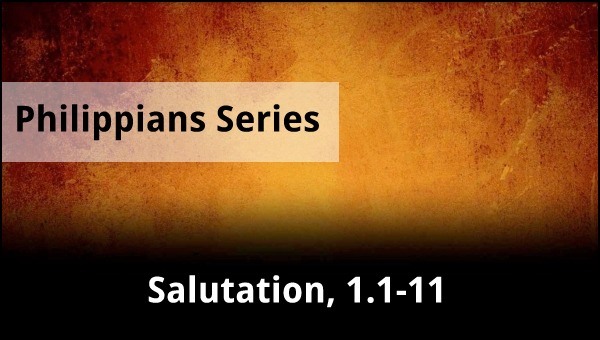By Tyson Thorne

Paul begins his letter in the typical Roman fashion, with a couple caveats. The Roman template included an introduction that identified the recipients, a statement of thanksgiving, and an introduction. Paul usually lengthened the thanksgiving section by including prayers for the people. We see this exemplified here as he introduces himself and timothy as slaves of Christ, then the letters recipients, and providing a long thanksgiving section (verses three through 11). The word translated as “slaves” is better understood as a bondservant, someone who sells himself into the service of another. This was not unethical or done unwillingly, and in Jewish culture denoted honor.
In his thanksgiving Paul introduces us to three concepts that are often repeated throughout the letter: joy, thankfulness and rejoicing. We’ll see how these concepts play out, but it is especially beautiful to note that Paul prays with joy for the people of the church at Philippi. How many of us could describe our prayer life as a joy? In fact, it may be a good idea to get introspective and figure out what characterizes your own prayer life. Was Paul so joyful? Because the congregants had put their trust in Jesus ten years before, and were continuing to grow in the faith and love for God.
Verse six provides us with a crucial piece of theology: “For I am sure of this very thing, that the one who began a good work in you will perfect it until the day of Christ Jesus.” To understand the teaching in this verse we must first take a step back and understand what Paul meant by the phrase “good work” and “the day of Christ Jesus.” It might seem obvious to many, unfortunately what is obvious is different for many.
Does “good work” refer to sanctification – that is spiritual growth – or does it refer to their financial gift mentioned in verse five (their “participation” is understood by most scholars to refer to the financial gift they gave Paul through Epaphroditus), or does it refer to the “defense and confirmation of the gospel” mentioned in in verse seven?
The “good work” could refer to sanctification, but there are a couple of problems with this understanding. The first of which is that spiritual growth is mentioned nowhere in the immediate context. Due to this fact, it appears as if this is a theological assumption forced on the text without any contextual confirmation. Some have argued, somewhat convincingly, that Paul is referring to the people’s “participation” in his ministry through financial giving. This has the benefit of being a part of the immediate context, and gives holy importance to the act of giving financially. In this view, the people share in every victory of Paul’s, which could even include the writing of the letter that we have in our Bible today. This is certainly possible, though the way it is written appears to indicate that that Paul is not looking back to their financial offering but rather beginning a new thought with the statement “For I am sure of this very thing…” Verse seven has a strong connection to verse six as Paul makes it clear he is talking about the same subject. For these reasons, I believe the strongest evidence is that the “good work” refers to the believer’s in Philippi defending the gospel from those who denounce it and confirming the gospel through their holy living.
We face a similar problem with the phrase “the day of Christ Jesus”. Does it refer to the day we die and are presented before God? Does it refer to the return of Jesus at the rapture? Or does it mean Judgment Day before the great white throne? This phrase is used only three times in the entire New Testament, and all three occur here in Philippians (1.6, 1.10 and 2.16). In the last of these occurrences Paul is giving a justification for his life works, which would indicate that this is the judgment of believer’s not for salvation but for reward. This is referring to the bema seat, when all our works will be judged by fire and what remains – those works we did for God – will result in our crown and reward. This judgment is different from the final judgment before the Great White Throne where only those who have rejected Christ will be judged. Exactly when this occurs is uncertain, however it probably takes place between the rapture and Jesus’ second coming to establish the millennial kingdom.
What do we learn from verse six, then? It means that the same God who gave us the gospel proves it’s veracity through the words and deeds of his followers which will be recounted at the bema judgment of Christ. On that day there will much rejoicing over all that was done for God. This understanding is confirmed by Paul’s prayer for the congregants, that their love (through which their good deeds are done) will abound and their knowledge (by which they defend the gospel) will increase so that at the bema judgment (day of Christ Jesus) they will be found blameless and full of the righteousness imparted to us by Jesus.
Who but Paul could pack so much theology into a simple greeting?
|
|
